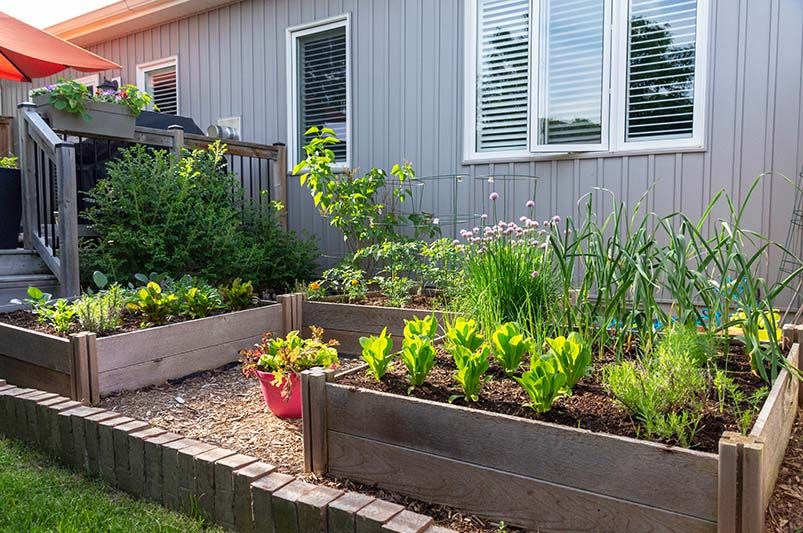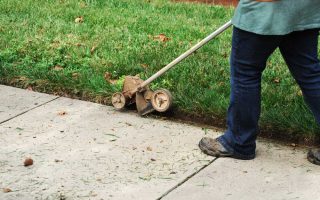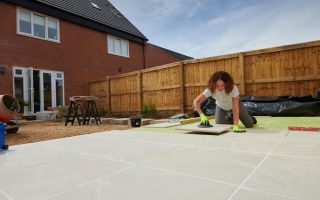I’ve watched enough people tackle garden projects themselves to spot the pattern. It starts with good intentions and a YouTube tutorial, then somewhere around the third trip to the builder’s merchant, reality sets in. What looked straightforward on a Saturday morning has turned into a month-long saga that’s cost more than just paying someone who knows what they’re doing. I’m not saying DIY is always a bad shout, but there’s a reason some jobs are better left to people who do them every day.
The Tools You’ll Never Use Again
This is where the costs start mounting up before you’ve even broken ground. That plate compactor you need for laying a patio properly costs about eighty quid to hire for a weekend, assuming you can even get one when you need it. The block splitter, the cement mixer, the proper spirit levels – it all adds up fast.
I’ve lost count of how many sheds I’ve seen filled with tools bought for one project and never touched again. That’s money sitting there doing nothing when a professional would have brought everything needed, used it properly, and been gone in a fraction of the time.
Materials Are Trickier Than They Look
Ordering materials sounds simple until you’re stood in the builder’s merchant trying to work out how much sand you actually need, what type of cement to use, and whether you want 20mm or 10mm aggregate. Get it wrong and you’re either making another trip or left with a pallet of stuff cluttering the drive.
Professionals get trade prices too, which often wipes out the saving you thought you’d make doing it yourself. That paving you’re buying retail for twenty quid a square metre, they’re getting for fourteen. Multiply that across a decent sized patio and the numbers shift pretty quickly.
Then there’s wastage. I always overorder slightly because running short halfway through a concrete pour is a nightmare. But amateurs tend to either underorder and make multiple trips, or massively overorder and end up with half a tonne of unused materials they’ve no idea what to do with.
Time Costs Money Too
Here’s what nobody factors in properly. That patio you reckon will take a weekend will actually take three weekends, possibly four if the weather’s against you or you hit problems. That’s a month of your life spent mixing concrete and aching all over instead of doing literally anything else.
If you’re taking time off work to do it, that’s actual earnings lost. Even if you’re using weekends, there’s a value to your time. Would you rather spend eight Saturdays laying a patio or two Saturdays earning overtime that more than covers getting someone in to do it in three days?
The Learning Curve Is Expensive
Every tradesperson has learned their skills over years, making mistakes on their own time and dime. When you’re learning as you go, those mistakes happen on your project with your materials.
I’ve seen people:
- Lay paving with no fall so water pools on the surface
- Use the wrong mortar mix that crumbles within a year
- Build retaining walls with no drainage that push over in winter
- Install decking with inadequate ventilation underneath that rots
- Plant expensive specimens in completely unsuitable spots
- Fixing these mistakes costs more than doing it right first time.
- Sometimes the whole lot needs ripping out and starting again, which means you’ve paid for materials twice plus wasted weeks of effort.
When DIY Makes Sense
I’m not completely against doing bits yourself. Painting a fence, putting up some trellis, planting a few shrubs – that’s all manageable and saves money without much risk of expensive disasters. Simple jobs where mistakes are easily fixed work fine for DIY.
But anything involving:
- Drainage and groundwork
- Structural elements like walls or steps
- Electrical work in the garden
- Significant amounts of concrete or mortar
- Projects affecting boundaries with neighbours
These need someone who knows what they’re doing. The cost of getting it wrong is too high, and the skill gap between amateur and professional is too wide to bridge with a weekend and some internet research.
The Hidden Value of Experience
A professional spots problems before they become problems. That slight slope you didn’t notice becomes obvious to someone who’s laid a hundred patios. They know the ground needs more work before anything goes down. They see that the drainage will be an issue. They notice the boundary fence is about to fall over and should be sorted first.
This experience saves money by preventing issues rather than fixing them later. It also means the job gets done efficiently without the stops and starts that come from figuring things out as you go.
Insurance and Guarantees Matter
If I build a wall and it falls down, I’m fixing it at my cost. If you build a wall and it falls down, you’re fixing it at your cost plus dealing with any damage it caused falling. If it’s fallen onto next door’s greenhouse, that’s a whole other level of expensive.
Professional work comes with insurance and usually guarantees. Something goes wrong, it gets sorted without more money coming out of your pocket. DIY has no such safety net. Learn more here about getting proper guarantees on landscaping work – it’s worth understanding what protection you should expect.
Realistic Cost Comparison
Let me break down a typical patio project. DIY costs might look like this:
- Paving slabs at retail prices – £1,200
- Sand, cement, hardcore – £300
- Tool hire – £150
- Extra trips for forgotten materials – £50
- Petrol and time for multiple merchant visits – £80
Your labour over four weekends – free apparently
That’s £1,780 before counting your time, and assuming nothing goes wrong.
Professional installation might quote £2,500 for the same job. That includes trade price materials, all tools, waste removal, proper groundwork, and guaranteed workmanship. They’ll finish it in three days and it’ll still look good in ten years.
The difference is £720, which sounds significant until you factor in that you’ve spent four weekends doing hard manual labour, taken all the risk of things going wrong, and have no guarantee the result will be any good.
The Satisfaction Factor
Some people genuinely enjoy physical work and get satisfaction from completing projects themselves. If that’s you and you’ve got realistic expectations about timescales and difficulty, fair enough. The doing it matters as much as the result.
But most people I meet who’ve attempted major garden DIY say the same thing afterwards: wish I’d just paid someone. The satisfaction of saving money evaporates when you’re three weeks in, everything hurts, it’s not going well, and you’re wondering why you ever started.
Getting Help Without Going Full Professional
There’s a middle ground worth considering. Get professionals to do the technical or heavy work, then do finishing touches yourself. They handle groundwork, drainage, and structural stuff. You do the planting, painting, and decorative elements.
This splits the cost whilst avoiding the expensive mistakes that happen when amateurs tackle technical work. You still get some involvement and save some money, but the bones of the project are done properly by people who know what they’re doing.
Making the Choice
Before starting any significant garden project, honestly assess your skills, available time, and what tools you’d need. Get a few professional quotes and compare them realistically against what DIY would actually cost including your time and the risk of mistakes.
Sometimes DIY makes perfect sense. Often, especially for anything structural or technical, it doesn’t. The money you think you’re saving has a habit of disappearing into extra materials, tool hire, fixing mistakes, and the value of all those weekends you’ll never get back.
There’s no shame in recognising that some jobs are best left to people who do them for a living. They’ll do it quicker, better, and often for not much more than you’d spend fumbling through it yourself. Sometimes the smart money is on paying someone who knows what they’re doing and spending your weekends doing something you actually enjoy.




